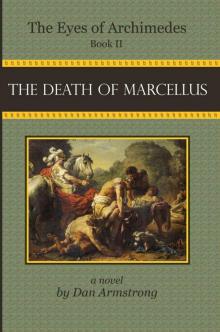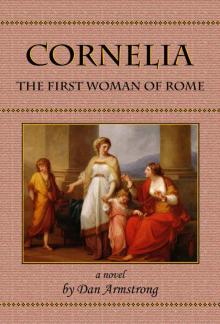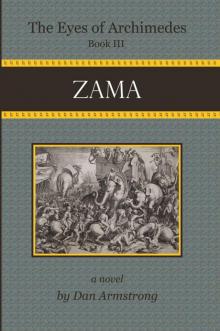- Home
- Dan Armstrong
The Death of Marcellus Page 5
The Death of Marcellus Read online
Page 5
“The birds eat with vigor,” said Fabius, lifting his voice so all could hear. “The auspices are favorable for this meeting.”
I looked at Marcus.
“This is done before every public event. By our tradition, the eagerness with which the birds eat determines the favor or disfavor of the gods.”
“Is that what you believe?”
“It’s as my mother says, the gods’ mood is reflected in everything.”
“But that’s not how your father sees it?”
“He’s a man who only believes in himself.”
When the poulterer had taken the chickens away, Marcellus advanced to the center of the room. The rest of our group stood around the room’s perimeter, pressed up against the walls with the others who had come to watch the proceedings. All Senate meetings were open to the public, and this one was filled to overflowing to hear Marcellus’ long awaited report from Sicily.
In his glorious red general’s cape and polished armor, head held high, Marcellus commanded attention without saying a word. He removed his red plumed helmet and held it against his torso. A gold-handled gladius hung from a black leather baldric at his hip. He surveyed the senators before him with no sign of the disdain I was sure he felt.
“I am here on behalf of two legions of Rome’s finest fighting men,” he said as an opening. “The seaport of Syracuse on the island of Sicily is now under Roman control. We have reorganized and re-staffed the garrisons in ten other Sicilian cities, including Megara, Leontini, Heraclea, Minoa, Camaria, Pachynum, Acrea, and Henna. I have just returned from Syracuse with five thousand of my soldiers and one hundred transports packed from stem to stern with treasure accumulated by King Hiero II through his fifty years of rule. For the pride of my men and the glory of the Republic, I request entrance to Rome through Porta Carmentalis for the purpose of displaying these spoils to the Roman people. I ask the Senate of Rome for the honor of a triumph.”
The consuls for the year were Gnaeus Fulvius Centumalus and Publius Sulpicius Galba. By tradition they alternated duty as princeps senatus, president of the Senate. In this instance, it was Fulvius. He stepped forward from the assembly of senators to address Marcellus. A short stout man, his dark hair was streaked with gray, and an uneven, similarly streaked beard traced along the edge of his jaw.
“I believe the honor is ours, General. For three years we have heard reports about your siege, the difficulties you overcame and the wonder of Archimedes’ weapons.” His eyes, small and brown, darted from side to side as he spoke. “We all know the importance of Syracuse to Hannibal’s line of supply. Only the recent fall of Capua compares in importance to the larger war. We applaud your success and welcome you back to Rome.” The audience responded with light applause. A few of those in the back shouted Marcellus’ name.
Marcellus stood firm as the statue of Bellona, no emotion whatsoever in his face.
Publius Licinius came forward. Fulvius recognized him.
“Yes, General,” said the pontifex maximus, “I can only agree with the Consul. All Romans are indebted to you and your soldiers. The securing of Syracuse was as important a part of your Sicilian campaign as any. There was great celebration in Rome with news of Syracuse’s fall.” Licinius paced across the Senate floor as he spoke, his toga no longer covering his head. “That said, I’ve heard that affairs in the south are not yet finished. Can you honestly tell the Senate, General, that Sicily is completely pacified to Roman needs?”
Thanks to Publius’ warning the night before, Marcellus expected criticism from Licinius. His answer came with no adornment. “Syracuse has been taken, but no, Senator, the task of subduing the entire island is not complete.”
“And is it not also true that you have returned with only a portion of your soldiers? A second legion still remains in Sicily to maintain Rome’s position on the island.” Licinius was not an attractive man. His skin was pale, almost white. Unusually tall and thin for a Roman, his face appeared too long, accentuated by his receded hairline and high forehead.
“That is true,” said Marcellus.
“And if I am not mistaken,” continued the pontifex maximus, stalking back and forth, “a Carthaginian fleet recently landed in Sicily with eight thousand infantry and three thousand Numidian cavalry. Reports from Titus Otacilius, your successor, say the Carthaginians have retaken Ergetium, and also Murgantia, where most of Sicily’s wheat is stored. Our own wheat stocks are dependent on those granaries, and last I checked, we are in need.”
Licinius paused, looked over his shoulder to five other senators standing together, then turned back to Marcellus. “The work in Sicily is simply not done yet, General.” He almost grinned. I thought of Marcellus’ reputation in battle. It seemed that the pontifex maximus was taunting the wrong man. “Don’t you think you’re being a bit hasty with this request? Besides, would it not be a shame, or worse, to parade triumphantly into Rome with just a select portion of your men, while the others still risk life and limb to complete the task you’ve left undone?”
This caused some murmuring among the other senators. One of them on the far left of the semi-circle spoke out. “I believe it was under our orders that those men are still in Sicily, Senator.”
“Quintus Minucius,” whispered Marcus.
“And we all know,” continued Minucius, “that troop movements often prevent the full army of conquest from participating in celebratory military parades.”
An old man, maybe the oldest man in the collection of senators, stepped forward on the far right of the semi-circle of men.
“Manlius Torquatus,” said Marcus quietly. “Fabius will let everyone else say their piece before he comments.”
Fulvius gave the floor to Manlius. He appeared unsteady on his feet and squinted as though he had trouble seeing. “Weren’t a fair number of your men survivors from Cannae, General? We wouldn’t want them parading into Rome under any condition. I believe there’s still a great deal of displeasure in this Senate that these men were allowed to participate in your campaign at all.”
“They remain in Sicily,” replied Marcellus. After the horrible loss at Cannae five years earlier, the survivors of this stain on Rome’s military reputation were stripped of their citizenship and sent to Sicily as outcasts. Marcellus had been rebuked by the Senate the previous winter for allowing these men to join his forces in Syracuse. “Whether these men will be allowed to return to Rome is not for me to judge. All I know is I needed them and they fought with valor.”
“It would have ended your career, General, if you’d brought them to Rome,” Manlius scowled. “We all know cowards when we see them. And they certainly don’t belong here—much less in our military. For this issue alone, General, I find your request for a triumph less than acceptable.”
Several boos and catcalls came from those around the perimeter of the chamber. Fulvius raised his hands for quiet. “Senators, please, you act as though this man has come to report a horrible loss, not a significant achievement. The matter of the Cannae survivors has been settled. They have been banned from Rome. That Marcellus was able to make good use of them is a sign of his capacity with men, even men of dubious merit. But this is not why we are here today. Marcus Claudius Marcellus, as distinguished a military officer as Rome has ever known, is requesting the opportunity to celebrate his victory with our citizens. The point has been made that Sicily is still subject to minor uprisings. That may be true, but we also know nothing will keep Carthage from making repeated attempts to regain the island. It’s too important to her war effort. It seems we’re airing petty grievances when a hero stands before us deserving accolade. Are there any questions regarding the campaign? Any specifics you might like Marcellus to enlarge upon?”
Quintus Fabius was recognized by Fulvius. Fabius stepped forward. From what I had gathered the evening before, this man, despite his age, was the most powerful magistrate in Rome. Such was his reputation that he had been appointed dictator, sole leader of Rome, in the second year of the war,
something done only in times of utmost urgency. Fabius had been heavily criticized when he called for a strategy of tactical defense. Many generals, including Marcellus, had spoken out against Fabius, called him a coward and given him the nickname of “Cunctator,” the delayer. But now, with the fall of Capua, and what seemed to be a reversal in the war, he was being called a genius. His word of support on any issue was critical.
Fabius addressed Marcellus. “General, you said that you’ve returned with considerable spoils.”
Fabius and Marcellus knew each other well, and had faced each other on this stage on a regular basis for twenty years. They often disagreed, but they also had much in common—their dedication to the state at all costs and their huge egos. They were known as “Rome’s sword and the shield.” Marcellus the warrior, Fabius the defensive strategist. And in Rome, at this particular point in time, only Marcellus was more clearly the favorite of the people than Fabius.
Marcellus nodded, respectful and cautious. “Yes, Senator. They are being unloaded from our transports as we speak.”
Fabius was short and stout with a paunch. His white hair was still thick and wavy. A dense, manicured, white beard covered most of his face. “Is there anything special about these spoils that would make them particularly important for the populace to see as part of a triumph?”
“Yes. Romans have never seen anything that compares with what we now have on the docks of Ostia.”
Fabius smiled, his eyes bright and focused. He had won plenty of military accolades in his life and had been elected to the position of consul four times. But it was Fabius’ calm before a crisis, his steadfastness, his unwavering demeanor and intelligence that gave power to his presence.
I could see the wart on his lip. It had led to a lot of teasing in his youth, making Fabius withdrawn and passive. His speech pattern had been slow and hesitant. Some thought him dim-witted. His beard nearly obscured the wart now, and he was as revered as any statesman in Rome’s history. I transcribed every word he said.
“What makes theses spoils so interesting, General? You mentioned Hiero’s treasure. But what is special about gold and silver, other than its obvious value to our treasury. During your campaign, many stories came back to Rome about your siege. Some quite fantastic. Is that in any way reflected in your plunder?”
“Yes,” answered Marcellus.
I didn’t know Marcellus as well at this time as I would later. His humility, especially in public, was part show. It seemed to me then that he was deliberately holding back what he knew was his strongest case for a triumph—the Greek artwork and the weapons he had stripped from the battlements of Syracuse. Fabius seemed to know this also.
“Is there any way, General, that you might give us some specifics—to make this more than a guessing game?”
Marcellus held quiet for a moment, then began. “The siege of Syracuse was made especially difficult because of the presence of the Greek scientist Archimedes. A renown mathematician and a superb engineer, he was capable of feats most would regard as impossible. I am sure that all of you have heard his name and of his incredible war machines.
“Archimedes had armed Syracuse with weapons far more formidable than anything I had ever witnessed before. Cranes that could lift a ship out of the water. Arrays of mirrors that could focus sunlight into fire. Catapults that could strike a target with a ten talent stone at a distance of half a mile. I have returned with a variety of these war machines. The valor of my soldiers will never be appreciated if the Roman people don’t have the opportunity to see just what it was they were able to surmount.
“These devices may be more valuable to the Roman cause than any number of boatloads of gold and silver. These machines of war will not only allow us to make Rome impregnable, but could also, at some point, give us a decided advantage against Hannibal in the field.”
This brought a hushed silence to the senators and those around the cella perimeter.
“Did you bring us Archimedes as well, General?” asked Fabius.
“No. I’m sad to report that the man was killed during the siege.”
I relived that moment in my mind. I was sure Marcellus could also see Archimedes’ body sprawled on the tower floor in a pool of blood.
“That’s a pity,” said Fabius. “Anything else beyond the weapons, General?”
“Artwork of the highest order,” said Marcellus. “Paintings from all around the world, collected over fifty years by one of the greatest kings of our time. Greek sculptures, fountains, ornate arches, deconstructed temples, and limestone with which to build temples of our own. I bring stone work from the greatest artisans of Greece to decorate our streets. Enough to change the face of Rome.”
Again Marcellus’ statements of grandeur awed the audience. Chattering and exclamation swelled from within the crowd. A young man among the bystanders not far from me called out, “More adulation of effeminate Greek wonders? Haven’t we had enough of that, General? Our triumphs should celebrate Roman strength, not some ancient civilization long gone to seed.”
“Marcus Porcius Cato, a military tribune at the age of twenty,” Marcus whispered to me. “He’s gained a reputation as a clever lawyer and a convincing orator. He’s too full of himself. I hope someone shuts him up.”
“Marcellus needs no more accolades,” continued the tribune. “He’s had triumphs enough for one man. I think he becomes too popular for his own good. Next he’ll be making himself dictator and telling us how to win the war.”
“Quiet, man!” demanded Fulvius. “This is the Senate, not the forum. The discussion is for the senators.”
When Cato started to call out again, Fabius raised his hand, immediately silencing the young man.
Fabius was the second oldest senator and the most esteemed. The Fabian clan represented the highest pedigree of Roman nobility, with ancestral ties going back to the royal house of the Tarquins. In a seven-year span Fabius had been elected consul three times and served as dictator for one entire year. He had also recently completed an unprecedented fifty years in the College of Augurs. He had ranking power in both the priesthood and the military.
Fabius gathered the eye of Marcellus before turning to face his colleagues in the Senate. His manner was proud and calm. “Tradition has always granted a triumph to military victories, and an ovation to military successes won by diplomacy and persuasion. It may be that the war in Sicily is still on-going, but I believe Claudius Marcellus merits no less than an ovation for securing Syracuse.”
Having been in Syracuse at the time of the siege, I couldn’t believe it was being called a success of “diplomacy and persuasion.” It had been war to me, with nothing less persuasive than one wave of soldiers after another. Fabius’ comments seemed like a complete misrepresentation of what I had seen firsthand.
Still, an ovation was too great a reward to some. Manlius voiced this opinion without being recognized. “You’re far too generous, Fabius. This man wasted two years outside Syracuse before finally breaking through the gates. I see nothing special in this military operation that merits an ovation, much less a triumph.”
“I think this general deserves a reprimand more than a celebration,” followed Licinius, haughty and indignant. “I have heard too many complaints from my priests that Marcellus ignores their readings and disrespects the gods. This man seems to feel that he is bigger than Rome, more important than Jupiter.”
Marcellus took all of this in stride. If he was angry, it wasn’t obvious. If he felt insulted, it didn’t show.
Fulvius addressed Marcellus directly. “General, have you anything to say that might add strength to your request?”
Despite my desire to see Marcellus confront these men with greater details of what he had overcome, he spoke like the loyal soldier he was. “I lead my men for the good of Rome. We don’t go into battle for the accolade it can bring, but to win the war. I leave the granting of awards to the wisdom of our Senate. The gold and silver will go to the Treasury of Rome no matter how it is b
rought through the gates. The artwork and stone will similarly find a home within the walls of Rome if I am granted a triumph, an ovation, or nothing at all. The glory is for my soldiers. That’s what’s important to me. Their courage, their loss of life and limb deserves recognition, and we all know that comes most powerfully from the lungs of Roman citizens when they cheer their victorious heroes. Think not of me, senators, when you make your decision. Think of the common soldier and what these celebrations mean to him.”
Cheers rose up all around me. The spectators who had come to see the review loved Marcellus, and it was this kind of sentiment, this humility, they loved the most.
Fulvius raised his hands to quiet the crowd. The hubbub and cheers died away. The issue was brought to a vote. Though many of the senators supported the request for a triumph, and a handful voted for a reprimand, the Senate took the middle road. Fabius’ suggestion that Marcellus receive an ovation was accepted. Several people in the crowd groaned when this was announced.
Marcus turned to watch a man step forward from the far left end of the string of senators. “Gaius Arrenius, one of the five tribunes of the plebs,” he whispered.
The man announced that he would take this opinion, as an ordinance, to the People’s Assembly. It would be voted on the following day.
We rode back to the Claudian farm immediately after the meeting’s completion. The fog had lifted to the top of Mount Alban, leaving a low, gray blanket of sky and a muted sun that passed in and out of view like the moon on a cloudy night.
Asellus and Marcus vented their anger all the way back to the farm. The cavalry commander, who spoke little except when drinking, voiced more outrage than Marcus. Publius had known this was coming and conferred quietly with Marcellus, who made no comment one way or the other about the decision.
That night at the dinner table, Marcellus listened to all the complaints against the Senate one more time. Portia remained quiet throughout. She watched her husband, judging the others’ comments by Marcellus’ reactions to them.

 The Death of Marcellus
The Death of Marcellus The Siege of Syracuse
The Siege of Syracuse Cornelia- the First Woman of Rome
Cornelia- the First Woman of Rome Zama
Zama